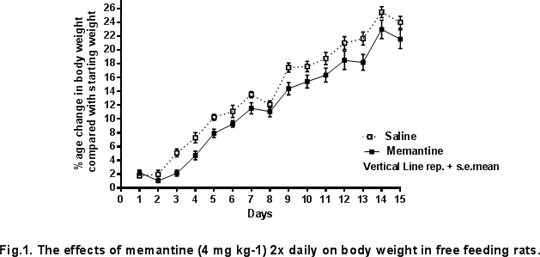Effects of chronic intraperitoneal administration of memantine twice daily on food intake and body weight in rats
The NMDA receptor antagonist memantine (mem) is used clinically in the treatment of Alzheimer’s disease and it was of interest to examine the effects on chronic administration of the drug on food intake and body weight, given that hypophagia and weight loss is characteristic of this condition as it progresses. We have shown that mem produces acute hypophagia when given i.p. to rats (Bains and Ebenezer, this meeting). However, we have previously reported that chronic administration of mem (4 mg kg-1) once daily had no effect on body weight in rats (1). However, because of possible differences in the pharmacokinetic profile of the drug in rat and man, it was suggested that it may be prudent to carry out further experiments in rats using daily multiple dosing schedules before reaching any potential translational conclusions about the effects of the drug on long term food intake and body weight (1). Thus, in the present study we investigate the effects of chronic systemic administration of the mem administered 2 times daily on 24 h food consumption and body weight in rats. Adult male Wister rats (n = 14; average starting body weights: 277.8 ± 7.3g) were divided into 2 equal groups and injected i.p. with either saline (Group 1) or mem (4 mg kg-1; Group 2) 2 time daily (between 9.00 – 9.30h and 17.00-17.30h) on a daily basis for 15 days. The dose of mem used in this study was previously found to reduce acute food intake in rats (Bains and Ebenezer, this meeting). Following the 1st injection on the 1st, 7th and 14th experimental days, the rats were placed separately into experimental cages with free access to food and water and cumulative food intake measured at 24h. (The animals received their 2nd injection of mem between 17.00h – 17.30h on these days). Daily body weight for each rat was also recorded and expressed as the percentage change relative to body weight on the day prior to the start of treatment. The body weight data were analysed by ANOVA and the 24h food intake data by the Student’s t-test. The results show that mem (4 mg / kg, i.p.) administered 2x daily for 15 days had no significant effects on (i) body weight gain (see Fig. 1) and (ii) 24h food consumption. Thus, for example, the mean ± s.e. mean 24h food intake after the 14th injection was as follows: saline 28.3 ± 1.2g, mem 27.2 ± 2.2g, n.s). The present results indicate that chronic administration of mem does not affect daily food consumption and body weight and suggest that the drug may not exacerbate weight loss reported in patients with Alzheimer’s disease.
(1) Bains, R.S. et al. (2013) Proceedings of the British Pharmacological Society at http://www.pA2online.org/abstracts/Vol11Issue3abst006P.pdf
|



